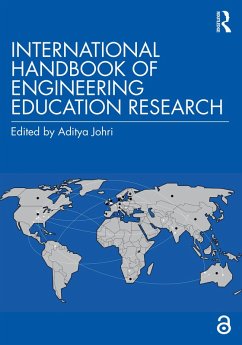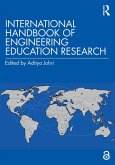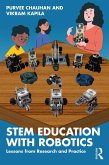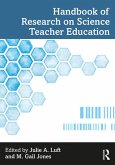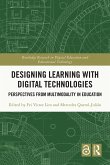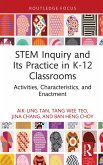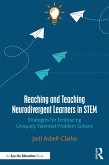International Handbook of Engineering Education Research (eBook, ePUB)
Redaktion: Johri, Aditya
0,00 €
0,00 €
inkl. MwSt.
Sofort per Download lieferbar

0 °P sammeln
0,00 €
Als Download kaufen

0,00 €
inkl. MwSt.
Sofort per Download lieferbar

0 °P sammeln
Jetzt verschenken
Alle Infos zum eBook verschenken
0,00 €
inkl. MwSt.
Sofort per Download lieferbar
Alle Infos zum eBook verschenken

0 °P sammeln
International Handbook of Engineering Education Research (eBook, ePUB)
Redaktion: Johri, Aditya
- Format: ePub
- Merkliste
- Auf die Merkliste
- Bewerten Bewerten
- Teilen
- Produkt teilen
- Produkterinnerung
- Produkterinnerung

Bitte loggen Sie sich zunächst in Ihr Kundenkonto ein oder registrieren Sie sich bei
bücher.de, um das eBook-Abo tolino select nutzen zu können.
Hier können Sie sich einloggen
Hier können Sie sich einloggen
Sie sind bereits eingeloggt. Klicken Sie auf 2. tolino select Abo, um fortzufahren.

Bitte loggen Sie sich zunächst in Ihr Kundenkonto ein oder registrieren Sie sich bei bücher.de, um das eBook-Abo tolino select nutzen zu können.
This comprehensive handbook offers a broad overview of contemporary research on engineering education, relevant for researchers and educators in engineering and STEM fields. Topics covered include sociocognitive perspectives on engineering education, the use of technology and online learning, and cultural and ethical issues.
- Geräte: eReader
- ohne Kopierschutz
- eBook Hilfe
- Größe: 3.64MB
Andere Kunden interessierten sich auch für
![International Handbook of Engineering Education Research (eBook, PDF) International Handbook of Engineering Education Research (eBook, PDF)]() International Handbook of Engineering Education Research (eBook, PDF)0,00 €
International Handbook of Engineering Education Research (eBook, PDF)0,00 €![STEM Education with Robotics (eBook, ePUB) STEM Education with Robotics (eBook, ePUB)]() Purvee ChauhanSTEM Education with Robotics (eBook, ePUB)44,95 €
Purvee ChauhanSTEM Education with Robotics (eBook, ePUB)44,95 €![Handbook of Research on Science Teacher Education (eBook, ePUB) Handbook of Research on Science Teacher Education (eBook, ePUB)]() Handbook of Research on Science Teacher Education (eBook, ePUB)105,95 €
Handbook of Research on Science Teacher Education (eBook, ePUB)105,95 €![Rebuilding the Natural Environment, Grade 10 (eBook, ePUB) Rebuilding the Natural Environment, Grade 10 (eBook, ePUB)]() Rebuilding the Natural Environment, Grade 10 (eBook, ePUB)26,95 €
Rebuilding the Natural Environment, Grade 10 (eBook, ePUB)26,95 €![Designing Learning with Digital Technologies (eBook, ePUB) Designing Learning with Digital Technologies (eBook, ePUB)]() Designing Learning with Digital Technologies (eBook, ePUB)42,95 €
Designing Learning with Digital Technologies (eBook, ePUB)42,95 €![STEM Inquiry and Its Practice in K-12 Classrooms (eBook, ePUB) STEM Inquiry and Its Practice in K-12 Classrooms (eBook, ePUB)]() Aik-Ling TanSTEM Inquiry and Its Practice in K-12 Classrooms (eBook, ePUB)21,95 €
Aik-Ling TanSTEM Inquiry and Its Practice in K-12 Classrooms (eBook, ePUB)21,95 €![Reaching and Teaching Neurodivergent Learners in STEM (eBook, ePUB) Reaching and Teaching Neurodivergent Learners in STEM (eBook, ePUB)]() Jodi Asbell-ClarkeReaching and Teaching Neurodivergent Learners in STEM (eBook, ePUB)30,95 €
Jodi Asbell-ClarkeReaching and Teaching Neurodivergent Learners in STEM (eBook, ePUB)30,95 €-
-
-
This comprehensive handbook offers a broad overview of contemporary research on engineering education, relevant for researchers and educators in engineering and STEM fields. Topics covered include sociocognitive perspectives on engineering education, the use of technology and online learning, and cultural and ethical issues.
Dieser Download kann aus rechtlichen Gründen nur mit Rechnungsadresse in A, B, BG, CY, CZ, D, DK, EW, E, FIN, F, GR, HR, H, IRL, I, LT, L, LR, M, NL, PL, P, R, S, SLO, SK ausgeliefert werden.
Produktdetails
- Produktdetails
- Verlag: Taylor & Francis eBooks
- Seitenzahl: 760
- Erscheinungstermin: 23. Mai 2023
- Englisch
- ISBN-13: 9781000897487
- Artikelnr.: 68030623
- Verlag: Taylor & Francis eBooks
- Seitenzahl: 760
- Erscheinungstermin: 23. Mai 2023
- Englisch
- ISBN-13: 9781000897487
- Artikelnr.: 68030623
- Herstellerkennzeichnung Die Herstellerinformationen sind derzeit nicht verfügbar.
Aditya Johri is Professor of information sciences and technology (IST) in the College of Engineering and Computing (CEC) at George Mason University, USA.
1. Introduction to the International Handbook of Engineering Education
Research Part 1: Comparative Perspectives for Engineering Education
Research 2. The Historically Global Forming of Engineering Education 3.
Gaps, Resources, and Potentials for Growth in Comparative Engineering
Education Research 4. Decolonization in Engineering Education 5. Developing
a Global and Culturally Inclusive Vision of Engineering Ethics Education
and Research 6. Disrupting Engineering Education Part 2: Theoretical
Orientations and Critical Approaches in Engineering Education Research 7.
The Role and Use of Theory in Engineering Education Research 8. Emotions in
Engineering Education 9. Advancing an Integrative Perspective of Identity
in Engineering Education 10. Critical and Cultural Analysis of Engineering
Learning 11. Critical Perspectives on Diversity, Equity, and Inclusion
Research in Engineering Education Part 3: Engineering Education Across
Contexts and Participants 12. Professional Learning for Pre-College
Engineering Teachers 13. Engineering Graduate Education in the United
States 14. The Overlooked Impact of Faculty on Engineering Education 15.
Informal Learning as Opportunity for Competency Development and Broadened
Engagement in Engineering 16. Enabling a Skilled and Diverse Engineering
Workforce with Non-Degree Credentials Part 4: Advancing Pedagogy and
Curriculum in Engineering Education 17. Institutionalizing Social Justice
in Engineering Curricula 18. Transforming Engineering Education through
Social Capital in Response to Hidden Curriculum 19. Collaborative Learning
in Engineering Education 20. Teaching for Creativity, Entrepreneurship, and
Leadership in Engineering 21. Educating the Whole Engineer by Integrating
Engineering and the Liberal Arts Part 5: Engineering Education at the
Intersection of Technology and Computing 22. Engineering Education and
Online Learning 23. The Use of Extended Reality (XR), Wearable, and Haptic
Technologies for Learning Across Engineering Disciplines 24. Online
Laboratories in Engineering Education Research and Practice 25. Towards a
Techno-Social Realist Approach in Primary and Secondary Computing Education
26. A Selective Review of Computing Education Research Part 6: Engineering
Education Research Methods and Assessment 27. Delineating Anti-Blackness in
Engineering Education Research Methodology 28. Broadening Dissemination
Genres to Share Hidden Insight via Design Cases in Engineering Education
Research 29. Considerations for Engineering Education Research Using
Quantitative Methods 30. Advanced Considerations in Quantitative Methods
for New Directions in Engineering Education Research 31. Contemporary
Approaches to Assessment of Engineering Competencies for Diverse Learners
32. The Future of Engineering Education Research
Research Part 1: Comparative Perspectives for Engineering Education
Research 2. The Historically Global Forming of Engineering Education 3.
Gaps, Resources, and Potentials for Growth in Comparative Engineering
Education Research 4. Decolonization in Engineering Education 5. Developing
a Global and Culturally Inclusive Vision of Engineering Ethics Education
and Research 6. Disrupting Engineering Education Part 2: Theoretical
Orientations and Critical Approaches in Engineering Education Research 7.
The Role and Use of Theory in Engineering Education Research 8. Emotions in
Engineering Education 9. Advancing an Integrative Perspective of Identity
in Engineering Education 10. Critical and Cultural Analysis of Engineering
Learning 11. Critical Perspectives on Diversity, Equity, and Inclusion
Research in Engineering Education Part 3: Engineering Education Across
Contexts and Participants 12. Professional Learning for Pre-College
Engineering Teachers 13. Engineering Graduate Education in the United
States 14. The Overlooked Impact of Faculty on Engineering Education 15.
Informal Learning as Opportunity for Competency Development and Broadened
Engagement in Engineering 16. Enabling a Skilled and Diverse Engineering
Workforce with Non-Degree Credentials Part 4: Advancing Pedagogy and
Curriculum in Engineering Education 17. Institutionalizing Social Justice
in Engineering Curricula 18. Transforming Engineering Education through
Social Capital in Response to Hidden Curriculum 19. Collaborative Learning
in Engineering Education 20. Teaching for Creativity, Entrepreneurship, and
Leadership in Engineering 21. Educating the Whole Engineer by Integrating
Engineering and the Liberal Arts Part 5: Engineering Education at the
Intersection of Technology and Computing 22. Engineering Education and
Online Learning 23. The Use of Extended Reality (XR), Wearable, and Haptic
Technologies for Learning Across Engineering Disciplines 24. Online
Laboratories in Engineering Education Research and Practice 25. Towards a
Techno-Social Realist Approach in Primary and Secondary Computing Education
26. A Selective Review of Computing Education Research Part 6: Engineering
Education Research Methods and Assessment 27. Delineating Anti-Blackness in
Engineering Education Research Methodology 28. Broadening Dissemination
Genres to Share Hidden Insight via Design Cases in Engineering Education
Research 29. Considerations for Engineering Education Research Using
Quantitative Methods 30. Advanced Considerations in Quantitative Methods
for New Directions in Engineering Education Research 31. Contemporary
Approaches to Assessment of Engineering Competencies for Diverse Learners
32. The Future of Engineering Education Research
1. Introduction to the International Handbook of Engineering Education
Research Part 1: Comparative Perspectives for Engineering Education
Research 2. The Historically Global Forming of Engineering Education 3.
Gaps, Resources, and Potentials for Growth in Comparative Engineering
Education Research 4. Decolonization in Engineering Education 5. Developing
a Global and Culturally Inclusive Vision of Engineering Ethics Education
and Research 6. Disrupting Engineering Education Part 2: Theoretical
Orientations and Critical Approaches in Engineering Education Research 7.
The Role and Use of Theory in Engineering Education Research 8. Emotions in
Engineering Education 9. Advancing an Integrative Perspective of Identity
in Engineering Education 10. Critical and Cultural Analysis of Engineering
Learning 11. Critical Perspectives on Diversity, Equity, and Inclusion
Research in Engineering Education Part 3: Engineering Education Across
Contexts and Participants 12. Professional Learning for Pre-College
Engineering Teachers 13. Engineering Graduate Education in the United
States 14. The Overlooked Impact of Faculty on Engineering Education 15.
Informal Learning as Opportunity for Competency Development and Broadened
Engagement in Engineering 16. Enabling a Skilled and Diverse Engineering
Workforce with Non-Degree Credentials Part 4: Advancing Pedagogy and
Curriculum in Engineering Education 17. Institutionalizing Social Justice
in Engineering Curricula 18. Transforming Engineering Education through
Social Capital in Response to Hidden Curriculum 19. Collaborative Learning
in Engineering Education 20. Teaching for Creativity, Entrepreneurship, and
Leadership in Engineering 21. Educating the Whole Engineer by Integrating
Engineering and the Liberal Arts Part 5: Engineering Education at the
Intersection of Technology and Computing 22. Engineering Education and
Online Learning 23. The Use of Extended Reality (XR), Wearable, and Haptic
Technologies for Learning Across Engineering Disciplines 24. Online
Laboratories in Engineering Education Research and Practice 25. Towards a
Techno-Social Realist Approach in Primary and Secondary Computing Education
26. A Selective Review of Computing Education Research Part 6: Engineering
Education Research Methods and Assessment 27. Delineating Anti-Blackness in
Engineering Education Research Methodology 28. Broadening Dissemination
Genres to Share Hidden Insight via Design Cases in Engineering Education
Research 29. Considerations for Engineering Education Research Using
Quantitative Methods 30. Advanced Considerations in Quantitative Methods
for New Directions in Engineering Education Research 31. Contemporary
Approaches to Assessment of Engineering Competencies for Diverse Learners
32. The Future of Engineering Education Research
Research Part 1: Comparative Perspectives for Engineering Education
Research 2. The Historically Global Forming of Engineering Education 3.
Gaps, Resources, and Potentials for Growth in Comparative Engineering
Education Research 4. Decolonization in Engineering Education 5. Developing
a Global and Culturally Inclusive Vision of Engineering Ethics Education
and Research 6. Disrupting Engineering Education Part 2: Theoretical
Orientations and Critical Approaches in Engineering Education Research 7.
The Role and Use of Theory in Engineering Education Research 8. Emotions in
Engineering Education 9. Advancing an Integrative Perspective of Identity
in Engineering Education 10. Critical and Cultural Analysis of Engineering
Learning 11. Critical Perspectives on Diversity, Equity, and Inclusion
Research in Engineering Education Part 3: Engineering Education Across
Contexts and Participants 12. Professional Learning for Pre-College
Engineering Teachers 13. Engineering Graduate Education in the United
States 14. The Overlooked Impact of Faculty on Engineering Education 15.
Informal Learning as Opportunity for Competency Development and Broadened
Engagement in Engineering 16. Enabling a Skilled and Diverse Engineering
Workforce with Non-Degree Credentials Part 4: Advancing Pedagogy and
Curriculum in Engineering Education 17. Institutionalizing Social Justice
in Engineering Curricula 18. Transforming Engineering Education through
Social Capital in Response to Hidden Curriculum 19. Collaborative Learning
in Engineering Education 20. Teaching for Creativity, Entrepreneurship, and
Leadership in Engineering 21. Educating the Whole Engineer by Integrating
Engineering and the Liberal Arts Part 5: Engineering Education at the
Intersection of Technology and Computing 22. Engineering Education and
Online Learning 23. The Use of Extended Reality (XR), Wearable, and Haptic
Technologies for Learning Across Engineering Disciplines 24. Online
Laboratories in Engineering Education Research and Practice 25. Towards a
Techno-Social Realist Approach in Primary and Secondary Computing Education
26. A Selective Review of Computing Education Research Part 6: Engineering
Education Research Methods and Assessment 27. Delineating Anti-Blackness in
Engineering Education Research Methodology 28. Broadening Dissemination
Genres to Share Hidden Insight via Design Cases in Engineering Education
Research 29. Considerations for Engineering Education Research Using
Quantitative Methods 30. Advanced Considerations in Quantitative Methods
for New Directions in Engineering Education Research 31. Contemporary
Approaches to Assessment of Engineering Competencies for Diverse Learners
32. The Future of Engineering Education Research
